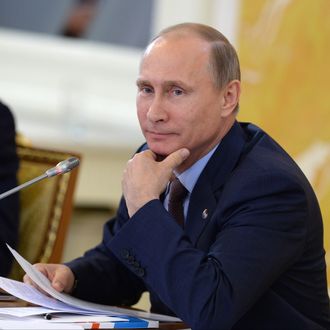
It was reported on Wednesday that the Russian plan for disarming Syria emerged out of more than a year of discussions between President Obama and Vladimir Putin – not just serendipitous bumbling by John Kerry – but regardless, the international enthusiasm for a potential way to make Bashar al-Assad stop gassing his people without dropping U.S. bombs gave Russia more power on the world stage than it’s had in years, maybe even decades. Now, with negotiations on the deal set to start in Geneva tomorrow, Putin is trying to boost his position even further with a New York Times op-ed. In a piece titled “A Plea for Caution from Russia,” Putin casts himself as a level-headed peacemaker, declaring, “We must stop using the language of force and return to the path of civilized diplomatic and political settlement.”
Without any acknowledgement that Russia has repeatedly used its Security Council veto to block efforts by the international community to rein in Assad, Putin starts by chiding President Obama for attempting to circumvent the United Nations. “We need to use the United Nations Security Council and believe that preserving law and order in today’s complex and turbulent world is one of the few ways to keep international relations from sliding into chaos,” Putin writes. “The law is still the law, and we must follow it whether we like it or not. Under current international law, force is permitted only in self-defense or by the decision of the Security Council. Anything else is unacceptable under the United Nations Charter and would constitute an act of aggression.”
Putin goes on to argue against an attack on Syria, saying it would increase violence, destabilize the Middle East, and “unleash a new wave of terrorism.” He repeats his claim that the opposition forces are not as moderate as the United States has suggested, and accuses the rebels of carrying out the attack on August 21 (though multiple nations have concluded that they weren’t responsible, and U.N. inspectors have reportedly found a “wealth” of evidence pointing to Assad). “No one doubts that poison gas was used in Syria,” Putin writes. “But there is every reason to believe it was used not by the Syrian Army, but by opposition forces, to provoke intervention by their powerful foreign patrons, who would be siding with the fundamentalists.”
Pointing to the ongoing unrest in Iraq, Afghanistan, and Libya, Putin says:
It is alarming that military intervention in internal conflicts in foreign countries has become commonplace for the United States. Is it in America’s long-term interest? I doubt it. Millions around the world increasingly see America not as a model of democracy but as relying solely on brute force, cobbling coalitions together under the slogan “you’re either with us or against us.”
After thoroughly bashing the United States, Putin finally mentions four paragraphs from the end that he’s happy the U.S. is working with Russia on the plan to disarm Assad. Then he closes with one more dig:
My working and personal relationship with President Obama is marked by growing trust. I appreciate this. I carefully studied his address to the nation on Tuesday. And I would rather disagree with a case he made on American exceptionalism, stating that the United States’ policy is “what makes America different. It’s what makes us exceptional.” It is extremely dangerous to encourage people to see themselves as exceptional, whatever the motivation. There are big countries and small countries, rich and poor, those with long democratic traditions and those still finding their way to democracy. Their policies differ, too. We are all different, but when we ask for the Lord’s blessings, we must not forget that God created us equal.
A long column criticizing President Obama is an odd way to kick off negotiations, but it’s not like John Kerry is going to cancel his trip to Geneva because Putin said the U.S. isn’t as special as it thinks it is in the Times.
Update: Indeed, the White House says it’s not even mad. An Obama administration official told CNN:
“That’s all irrelevant … He put this proposal forward and he’s now invested in it. That’s good. That’s the best possible reaction. He’s fully invested in Syria’s CW disarmament and that’s potentially better than a military strike – which would deter and degrade but wouldn’t get rid of all the chemical weapons. He now owns this. He has fully asserted ownership of it and he needs to deliver.”






























